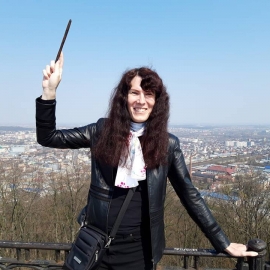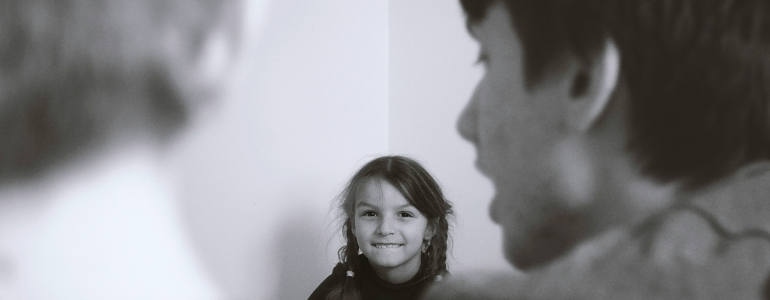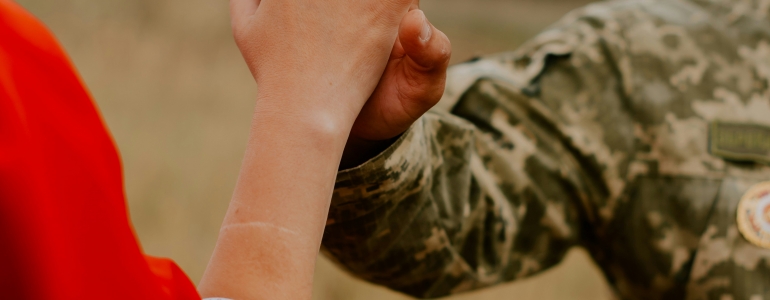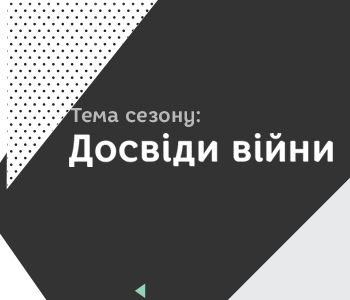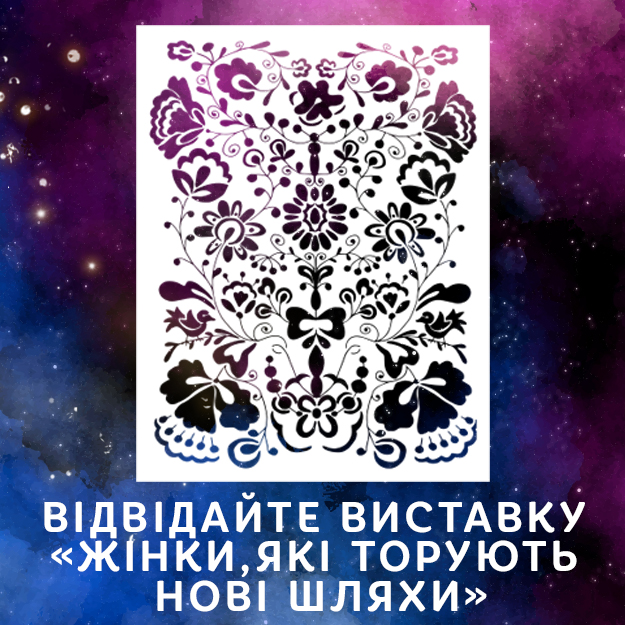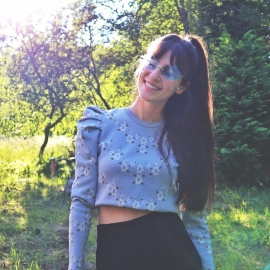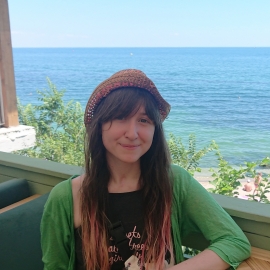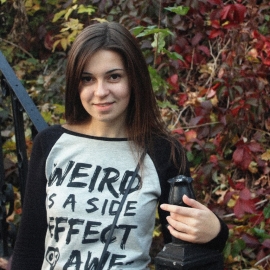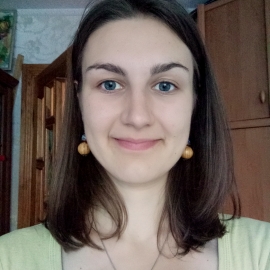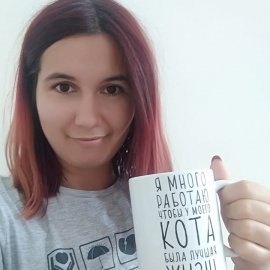Translated by Galyna Kotliuk.
It has just so recently happened that I, as an activist, have spoken less on my own behalf, and more either on the behalf of transgender people (or the LGBT+ community in a broader sense) or women. Now I want to return to the principle “the personal is political” and begin this text talking about my own experience – the experience of a transactivist who has been in Kyiv since the first day of the full-scale war.
On the very first day, when Kyiv was under Russian shelling and the occupiers were pushing at us from the north, I began to adapt to this new reality, regularly following the news. At that time, almost in the first hours of the invasion, I received an email from an international European organization, in which I am involved as a member of its board. Among other things, I was offered support in case I needed to evacuate from Ukraine.
Until the time of the Russian Federation troops inglorious escape from Kyiv, I received several more similar proposals offering travel assistance or support with accommodation in a particular country. In separate cases, help was coming from people I had once met at different events, but who could not be called my close friends. My answer was always the same to everyone, “Thank you very much, I appreciate that, but for the time being, I’m staying in Kyiv.”
At the same time, I was receiving inquiries from journalists. I did not have enough resources to communicate with them at the time, since almost all of my energy was directed at keeping my life and work routine. Now I somehow regret that I did not answer them, as very soon the standard inquiries started to sound like, “Maybe you know a transgender person who has experienced or is experiencing problems while crossing the Ukrainian border?” Articles talking about the fate of the Ukrainian transgender community through the experience of its members started to appear in Western media.
At some point, I was also invited to an initiative built around a campaign designed to simplify the border crossing procedure for Ukrainian transgender people, which is now more complicated than ever due to martial law.
And if at first I found this kind of attention to my own persona and to transgender Ukrainians in general to be quite pleasant, very soon it started to annoy and sometimes even outrage me since all the care and concern about us were ultimately reduced to the issue of leaving Ukraine.
I would like to mention that I oppose any form of generalization. During the war, different people – including transgender people – have found themselves in different situations and under the impact of different factors. These are external factors, which depend on a person’s place of residence and nearness to the active war zone, as well as circumstances that keep people in a location or vice versa. These are also internal factors defined by a person’s emotional state that can fluctuate from a sense of duty to feelings of anxiety and fear. Based on a combination of these factors, people decide whether to stay or leave, and any decision has a right to exist and should not be judged. At the same time, my decision, yours, or someone else’s, cannot be a universal example for everyone else to follow.
I will not delve into the personal details of what factors influenced my own decision. But there will always be a key one among the internal factors: my home is here and my place is here . Hence, the decision to stay was my decision by default. In order for it to change, the circumstances would have to change to ones incompatible with life and survival. In my opinion, such a moment has not come yet in Kyiv during all this time – unlike its suburbs, such as Irpin and Bucha.
However, it seems like in the Western information space, the only expected decision is to leave Ukraine – at least it is anticipated from transgender people, and LGBT+ in general. Meanwhile, those of us who consciously stay – not because they cannot do so due to certain unfavourable circumstances – are regarded as a kind of abnormality. And those who join the Armed Forces of Ukraine and go to defend their country with weapons in their hands are probably perceived like a collective phenomenon that could never happen.
Shortly after, we could observe a person who actually embodied the (stereo)typical Western ideas about Ukrainian transgender people. This was the singer Zi Faámelu, who currently is one of the most famous public transgender persons in Ukraine, making her more accessible to the media and, ultimately, more visible in the media information space. In the first days of the full-scale invasion, she decided to leave Ukraine, but the male gender stated in her passport made everything more complicated for her. In the end, however, Zi crossed the border, and later was telling different versions of how she managed to do it in her various interviews. She also described the general situation with transgender rights in Ukraine, presenting it as very unfavourable and transphobic, and between the lines, it was easy to read that this country is not worth staying in.
I would like to point out that the level of transphobia faced by Zi, as well as the ability for a person of her prominence and income to resist it, are, in my opinion, not the same as that faced by an average transperson in Ukraine. Again, I would not like to question and condemn anyone’s personal experience and choices. However, I find the very idea that this is exactly how a typical Ukrainian transgender person now looks in the eyes of Western audiences rather disturbing.
Wait, someone will say, but isn’t that the same thing human rights activists are talking about? They are also saying that our laws for transgender people are very imperfect, the procedures are long and complicated, and some rights are limited. That transpersons are discriminated against at work, at schools, at hospitals, when renting a flat, and in many other social situations. That the manifestations of transphobia can be encountered anywhere, from family to government agencies. Finally, if we have a look at the human rights ratings for transgender people and LGBT+ people in general that are regularly compiled, for example, by ILGA-Europe, Ukraine finds itself, to put it mildly, not in first place.
It really seems to be so. But there is one important nuance.
It can be accepted as a given that “everything is bad”: this is how it is, and there is nothing you can do about it. On the other hand, we can regard it as a problem that needs to be solved: this is how it is now, so what should we change to make it better? The first passive approach regards a transgender person only as an object. And all that can be done is to take this object away from a bad place and put it a more favourable one. According to the second approach, a transperson becomes an active subject of change themselves.
And such changes, in fact, have already taken place in Ukraine. In 2016, the gender transitioning procedure was completely reorganized, making it simpler, more accessible, and less humiliating. In the same year, the first trans march took place in Kyiv and later it became a regular event. I would like to mention that such marches, also known as trans prides, are not very common even in the Western societies (and are completely impossible in Russia). Two times, in 2015 and 2018, an international transgender conference was held in Kyiv and involved experts in the fields of human rights, medicine, and politics.
The media began to cover transgender-related topics more often and, eventually, more carefully and respectfully. Our activists are represented in international organizations; our voices, although not very often, sound at different levels, including at the UN. This is not just a compilation of solitary acts of activism, it is a powerful movement that is actively developing, expanding, and gaining power with every coming year.
But should you go outside this “activist bubble” – and, oops, suddenly this whole movement is invisible, and the Ukrainian transgender community appears exclusively in the form of passive victims. With the start of the full-scale war, the Western activist community surprisingly easily picked up the same perception and rhetoric.
I believe all this has deep roots that go beyond LGBT+ context.
Back in his time, Francis Fukuyama articulated “the end of history” concept, according to which liberal democracy is the highest point of human society development, and eventually it will be reached everywhere, after which global socio-political changes will stop. It seems, however, that ordinary citizens of Western democracies think the world is already practically there. After all, in their opinion, it is their countries that form the basis of this world. Of course, some “third-world” countries still remain outside of this global framework, but their agency and power are too insufficient to take them into consideration and the situation there could be changed through human rights improvements.
The Russian Federation, which retained its international political influence after the collapse of the Soviet Union and, at the same time, developed and deepened its ties with the West, eventually began to be perceived almost as a part of the “First World.” Part of it is generally democratic, so to speak, but it has its own shortcomings. Such an image was, of course, facilitated by the efforts of the Russian government, which tried to maintain a hybrid image of the regime: rigid authoritarian mechanisms hidden behind a superficially democratic cover in which elections are held regularly, political opposition exists, and NGOs somehow function.
Such a picture of the world is exempt from rapacious wars – there are simply no reasons for them in the world of liberal democracy. In fact, the “first countries” have not experienced them since 1945, and the principles of their territorial integrity can be traced back to this period. Of course, there is Afghanistan and the Middle East, where people are constantly at war. However, first of all, this is the periphery, the “Third World”, an exception that only confirms the common rule. Secondly, these wars are interpreted either as guerrilla insurgencies or anti-terrorist struggles against large groups such as ISIS. This diminishes their status compared to war in its conventional definition, when one state attacks another.
Such a stance resulted in the euphemistic naming of the 2014 events in the Crimea and Donbas, instead of simply calling it a war started by the Russian Federation against Ukraine. Moreover, Russia itself made every effort to disguise its direct involvement in the hostilities and political processes in the so-called republics in the eastern part of Ukraine under its control. And I’m not even talking about “Putin-Verstehers” who avoided acknowledging Russia’s responsibility and carried out the Kremlin’s direct orders. Rather, I am talking about people with sincere liberal views – people for whom it has always been a “conflict”, a “crisis”, another local misunderstanding between “brother nations” that involves ambiguous “separatists” and “terrorists.” At the end of the day, the Ukrainian authorities also have officially referred to the war as the Anti-Terrorist Operation.
The full-scale invasion of Ukraine, which Russia openly launched on February 24, could no longer fit into “the end of history” paradigm. And a Westerner’s first desire in this situation was to “rewind everything” as soon as possible, to unsee everything as if it had never happened. To somehow resolve the situation by instantly ceasing all the hostilities and returning to the usual status quo. It doesn’t matter that this scenario would be only possible at the expense of Ukraine: if we stop resisting and agree to Russia’s demands, i.e., complete surrender.
Exactly such an outcome was expected by many, starting with Western left-wing feminists, fairly criticised by Tamara Zlobina, and German so-called intellectuals, and finishing with French President Macron. And when it became clear that Ukraine had resisted the first attacks, they even insisted on such an end result, presenting it as allegedly the best solution for Ukrainians. After all, if Russia is just a little short of the high standards of Western democracy, then there is nothing really terrible about it. Of course, a country that meets such standards should not start the war in the first place; but within their [transl.: Westerners’] perspective, a certain level of “doublethink” is inevitable.
The great war, which is happening not “somewhere out there”, but on the edge of the “First World”, looks like an absolute horror from this perspective, and peace appears to be a universal solution. War-ravaged territory is a kind of a deep black hole that is scary even to look into. And if peace is not about to happen in the near future, then the best thing that could be done is to at least get someone out of it. Even the president received proposals to evacuate to the EU in the first days of the full-scale invasion, let alone transgender people whose life was rather hard in peaceful times.
It must be difficult to imagine that such people may consciously want to stay in a country that is being sucked into this “black hole”, be identified with it, and make every effort to defend it from the invaders. Moreover, to imagine that, under certain circumstances, perfect liberal Western countries can also be dragged into the “black hole” is beyond all reason. It is easier to convince oneself that it is this perfection or its absence that determines who can or cannot be affected by it. And it is better not to look into the hole in order not to destroy the illusion – “don’t look up”, as it was framed in a recent movie.
But if you do look up and look closely, you can see that, firstly, the real “black hole” is formed on the territories occupied by Russians, and therefore the responsibility for it lies not with an abstract war, but specifically with the Russian Federation. And secondly, you will realize that there is no civilizational gap between the “First World” and the countries that have become a battlefield. That, in fact, the former is not a pinnacle of democracy and the latter is not a rudiment of the past.
Coming back to the topic of transgender identities: what can be seen in this context?
For example, the fact is that today in Hungary there is no legal recognition of gender at the legislative level. In Finland, it is necessary to undergo a sterilization procedure to get legal recognition of gender. In Poland, it is necessary to sue one’s own parents to acquire it. And in the UK, this procedure requires obtaining a Gender Recognition Certificate from the Gender Recognition Panel, which can take years.
In other words, acquiring legal recognition of gender in these countries is more difficult than in Ukraine. The first three of them are members of the EU, the last one is a member of the G7. And yes: there are other countries where this procedure is organized better than in Ukraine. But, of course, we are not speaking about the difference of societies here.
Again, Ukrainian men and women, who were forced to escape from the war and seek asylum in different European countries, compare the life in these countries with their life in Ukraine and notice both the advantages these countries have as well as the things that work better in Ukraine. Among the latter were named online banking, postal services, the medical appointment system, round-the-clock shops, and even Ukrzaliznytsia [transl.: Ukrainian Railways], which has been a popular object of our common criticism. Finally, let’s mention the Armed Forces of Ukraine, who are currently lagging behind NATO countries in terms of technical equipment, but in terms of combat experience – after the resistance with which they met the numerically superior forces of the Russian army – there are a lot of things NATO could learn from us.
Considering all of this and realizing that it is too early to talk about “the end of history”, we have to take another step and articulate the next important conclusion.
The current international world order is not just imperfect, it has proved to be wholly incapable to face new challenges. Organizations such as the United Nations, the OSCE, the Council of Europe, the EU as such, and NATO to some extent, have proved to be either completely powerless or very ineffective in the reality of the big war. Approaches calibrated to implement local-level improvements and facilitate adjustments of separate shortcomings are useless against a completely anti-human system. “Deep concerns” and excessively bureaucratic decision-making methods do not work in situations where decisive reactions and actions are needed in order to stop and mitigate the aggressor.
Thus, countries such as Ukraine should not be discussed in terms of their endeavours to become a recognized part of the global world; but rather, the world must improve globally, and Ukraine must be a rightful participant of this process. Now, more than ever, Ukraine can have a proactive and even leading part in these changes.
And now, coming back to LGBT+ issues, I want to say that the same applies to the sphere of activism, which employs a good many of the concepts, narratives, and approaches coming from the West, and the backbone of which constitute NGOs funded by Western grants. No, this has nothing to do with “grant-eaters”, “sorosyatas” [transl.: derives from the name of George Soros and is a derogatory term to describe those working in structures financed by Soros foundations, as well as those with liberal views] and similar labels used by the right-wing radical opponent – this kind of work has nothing to do with Ukrainian activists carrying out Western instructions. Nevertheless, cooperation with the West creates certain frameworks and standards in which interaction with Western organizations happens from the position of the “student–teacher” power structure. In the process of such mentoring, different ideas are often accepted and assimilated uncritically, without proper reconsideration and adaptation to our society. So, perhaps, it is high time for Ukrainian activism to acquire more independence and develop its own approaches to human rights activism based on the already existing vast experience, free from blind copying and inferiority complexes.
These arguments, of course, require a detailed analysis, which itself would be worth a separate article, perhaps even more than one. Finishing this text, I would like to return to my initial point – to my personal experiences.
Well. If someone expects that I and other people like me will only be victims who suffer, that we will only run away from danger without trying to resist it – to resist the Russian occupiers the same as we resist the local carriers of transphobia and other kinds of discrimination – they will get a very short answer from me.
That is never going to happen.
